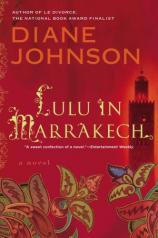Reading Group Guide
Discussion Questions
Lulu in Marrakech

1. Reread the prologue in E. M. Forster’s A Passage to India. How did you interpret it before reading the novel, and how do you interpret it now?
2. On the very first page, Lulu Sawyer discusses Americans’ tendency toward gullibility, that “our ability to fool ourselves is greater than the ability of others to fool us.” In what ways was she describing herself? How did that help or hinder her in her work?
3. Given Lulu’s line of work, trust is a major theme throughout the novel. Who turns out to be most trustworthy? Least? What about Lulu herself?
4. At the bottom of page 47, Lulu confesses that she hates to bargain, probably because of the lying implied in the transaction. How does this jibe with her chosen career? What about her notion of victory and defeat that are embedded within any bargain?
5. Sexism affects all of the women in the novel, in both religious and institutional terms. How is the sexism Lulu faces from her colleagues different than the sexism Suma and Gazi face in their daily lives, if it is in fact different?
6. Lulu seems to be suspicious of Ian almost from the beginning, and yet she falls in love with him. What does this say about her aptitude for her job? How might she have handled things differently?
7. What role do Posy and Robin play in the novel? If they weren’t in this precise setting, do you think Posy and Lulu would be friends? Which would you rather have as a friend?
8. Discuss the character of Colonel Barka. How did he use Lulu, and vice versa? Ultimately, was he a “good guy”?
9. On page 192, Taft lumps Gazi and Suma together. Do you imagine the Muslim men do the same with Lulu and Posy? What is the effect of this stereotyping?
10. How is the way Taft approaches his job different from the way Lulu approaches hers? In what ways is each one’s method more effective?
11. On page 206, Lulu adopts a line from T. S. Eliot as a mantra: “Prayer, observance, discipline, thought and action.” How well does she follow through on that notion?
12. Lulu accepts the notion of ambivalence as being “built into life in the shadows; even as you hope for unshakable convictions, you feel them drain away” (page 251). How has her experience in Marrakech weakened her convictions? How strong were they to begin with?
13. After Amid’s death, Lulu feels that her guilty conscience is “not so much a moral qualm as chagrin at having screwed up” (page 265). What does this say about her character? Is she better suited to her job than she appeared to be?
14. Reread the letter from Ian’s father to Lulu on page 266. How did you interpret it when you first read it? Did your interpretation change as you read further?
15. Why does Suma steal the notebook from Khaled? Why does the colonel pass it on to Lulu?
16. After reading Gazi’s letter, Lulu thinks, “It helped me understand what had gone wrong between her and Ian, if anything had: She was too dumb” (page 306).What makes her think this? Why did Gazi write to her?
17. Lulu imagines herself to be the Ingrid Bergman character in the film Notorious, with Ian in the Cary Grant role and Lord Drumm as Claude Rains (page 295). Have you seen the film? Do you think her casting is accurate?
18. 6. Discuss the ending. Was it satisfying to you? In what ways did it surprise you? What questions, if any, do you still have about what happened?
Lulu in Marrakech
- Publication Date: September 29, 2009
- Genres: Fiction
- Paperback: 307 pages
- Publisher: Plume
- ISBN-10: 0452295599
- ISBN-13: 9780452295599







